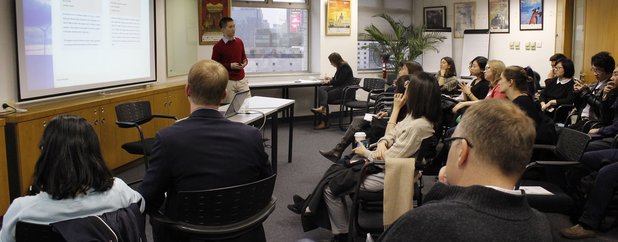
November 2018 - At the meeting held on behalf of the German Federal Ministry for the Environment, Nature Conservation and Nuclear Safety (BMU), two specially selected experts gave insights into the framework conditions for and development trends in China’s renewable energy sector. They then outlined the procurement options available to companies operating there.
Peng Peng, Secretary General of the China New Energy Investment and Financing Alliance (CNIFA), explained that in the future, grid operators at national, province and local level, as well as electricity companies, heavy-consumption end users and consumers with their own power stations will be required to implement RPS quotas. In particular, Peng Peng said that binding participation by grid operators at province level opens up opportunities to tackle the low levels of green electricity being fed into China’s grid.
In the second presentation, Quiao Tain, an associate at the Rocky Mountain Institute, used two case studies to outline the options available to companies in China in the procurement of renewable energy. Although there were now more options available following the introduction of pilots like the GEC scheme, market-based transactions between consumers and producers had still not occurred to any great extent. Quiao Tain also emphasised that the expansion of market-based mechanisms harboured as-yet unused potential which could play a key role in increasing renewable energy use in China.
A detailed report on the networking meeting is contained in the October issue of Econet Monitor, a magazine published by AHK Greater China in Beijing. The article can be downloaded here.
Note: The publication is available only in German.
Cookie Settings
Marketing-Cookies werden von Drittanbietern oder Publishern verwendet, um personalisierte Werbung anzuzeigen. Sie tun dies, indem sie Besucher über Websites hinweg verfolgen.
Provider:
Statistik Cookies
Statistik-Cookies dienen der Analyse und helfen uns dabei zu verstehen, wie Besucher mit unserer Website interagieren, indem Informationen anonymisiert gesammelt werden. Auf Basis dieser Informationen können wir unsere Website für Sie weiter verbessern und optimieren.
Provider:
Erforderliche Cookies
Erforderliche Cookies sind für den reibungslosen Betrieb der Website zuständig, indem sie Kernfunktionalitäten ermöglichen, ohne die unsere Website nicht richtig funktioniert. Diese Cookies können nur über Ihre Browser-Einstellungen deaktiviert werden.
Provider: